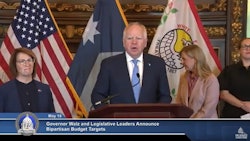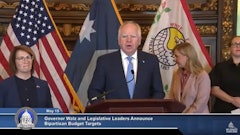
Minnesota lawmakers came to a conference committee agreement on modifications to the state’s adult-use cannabis law on May 17 as state regulators continue to work toward commencing a licensed marketplace two years after legalization.
The bicameral conferees adopted changes to the law that Gov. Tim Walz signed in May 2023 to establish and regulate an adult-use cannabis industry. The 2023 law also created regulations, licensing and taxation for the state’s existing hemp market.
The omnibus cannabis policy bill adopted this session aims to tackle several issues that the state’s Office of Cannabis Management (OCM) brought forward ahead of launching adult-use sales, a commencement many had hoped would play out in early 2025.
OCM Interim Director Eric Taubel told committee conferees on May 17 that the office now has more than 100 people focused on their core mission: fostering an equitable cannabis industry that prioritizes public health and safety, consumer confidence and market integrity.
“This bill has provisions that touch on each of those sort of broad categories within the mission statement,” Taubel said, outlining the OCM’s recommended changes to the state’s application process, licensing rollout, social equity qualification standards, and medical cannabis telehealth and remote consultation opportunities, among other provisions.
More specifically, the legislative tweaks would:
- create a lower-potency hemp wholesaler license;
- allow people who had an adjudicated cannabis-related sentence to be social equity applicants;
- allow vendors to provide samples at cannabis events;
- allow manufacturers in Minnesota to export low-potency hemp products out of the state that aren’t compliant in Minnesota;
- allow testing facilities to begin testing while in the accreditation process; and
- allow a beverage to be one serving with no more than 10 milligrams of THC.
The Senate voted along party lines, 34-3d, on May 17 to pass the conference committee report, and the House voted, 80-50, on May 18 to also pass the cannabis policy agreement, sending it to Walz’s desk.
Rep. Zack Stephenson, DFL-Coon Rapids, the legislation’s sponsor in the House, also sponsored the adult-use legalization bill in 2023. Before the House vote on May 18, Stephenson pointed out the need for a provision allowing for the licensing of wholesalers for low-potency hemp beverages.
“I want members to know that these low-potency hemp beverages are a real Minnesota creation and something that is a nation-leading thing that has been really productive for our local breweries,” Stephenson said. “A lot of our little craft breweries across Minnesota are struggling right now due to declining sales in the beer space. And many of them have found significant economic gain by taking up these low-dose, hemp-THC products.”
While Minnesota has cracked down on cannabis flower labeled as hemp, the state legalized edibles and beverages infused with hemp-derived THC in July 2022, providing for robust business opportunities for local brewing companies.
Rep. Nolan West, R-Blaine, urged his House colleagues on Saturday to support the conference report on the legislation, which he said will bring Minnesota “one step closer” to safe, tested and legal cannabis.
West indicated that Minnesota has been far from swift in its program rollout, pointing out that Minnesota had a six-month head start on Ohio in legalizing adult-use cannabis. Yet, Ohio’s licensed dispensaries have sold more than $500 million in adult-use cannabis since launching sales in August 2024, according to the state’s Department of Commerce.
“Meanwhile, Minnesota, with our six-month head start, has—let me see here—not a single licensed store,” West said. “We could do a lot better. Thankfully, this bill does help. We have a hopelessly convoluted regulatory system based on this fantasy that you can create a craft cannabis market based on government regulation. It’s like trying to run Amazon out of an Etsy store with three inspectors checking the doilies for antitrust violations.”
The OCM announced earlier this month that it will conduct a series of license lotteries beginning on June 5, starting with social equity and general applicants in three categories: adult-use cultivators, manufacturers and vertically integrated “mezzobusinesses” (medium). The office is also planning to hold a lottery for aspiring social equity retailers on June 5; however, a lottery for general applicants vying for dispensary licenses will be held at a later date this summer.
West said he believes the 2023 adult-use cannabis law, which he was critical of but ultimately voted in support of passing, had preemptively set up businesses to fail through overregulation.
“For these people who want to get involved in this new market, we’re moving one step closer so they can finally pursue their dream,” he said in support of the 2025 policy revisions. “And honestly, it is the American dream to start a business and provide for your family. And that’s what a lot of people have been waiting to do.”
Leili Fatehi, partner at Minnesota cannabis consulting firm Blunt Strategies, testified before the conference committee on May 17, supporting the report but also calling into question the omission of certain policies. Fatehi also owns Crested River, a vertically integrated hemp business in Morgan, Minn.
Fatehi said the state’s adult-use law that lawmakers passed in May 2023 was rooted in equity, public health and economic opportunity for small and local businesses.
“But what we’re seeing now, both in implementation and in legislative follow-up, is not aligned with the principles that earned this law overwhelming public and bipartisan support,” she said. “Instead, the regulatory framework is becoming increasingly fear-based rather than risk-based, layering on costs, restrictions and inconsistencies that defy both common sense and real-world market dynamics.”
Fatehi said that small businesses and those operating in the lower-potency hemp space are now facing the highest fees, the most limited operating margins and the least clear pathway to market stability, specifically calling out licensing fees in the hemp space.
She said many low-potency hemp businesses serve wellness-focused consumers in localities that are functionally banning adult-use businesses through zoning and regulations.
“For us, hemp isn’t the side hustle; it is the actual business,” Fatehi said. “For medical patients, the system is moving towards less product availability, fewer access points and higher prices—the exact opposite of what patients and their families were promised. For social equity operators, the advantages that were promised have been delayed, diminished or quietly dismantled. And for local governments, instead of receiving clear guidance and support they need to regulate appropriately, they’ve been left in a state of either paralysis or overreach.”
Local control was a contentious point in adult-use legalization debates two years ago, when many Minnesota Republicans wanted to allow municipalities the option to ban cannabis businesses from operating within their jurisdictions. Instead, the final law allowed cities to adopt ordinances limiting the number of cannabis dispensaries in their communities; however, it required cities to allow at least one retail facility for every 12,500 people.
The 2023 law intended to ensure that cities couldn’t outright ban dispensaries, Rep. Jessica Hanson, DFL-Burnsville, said during the May 17 conference committee hearing. However, aspiring cannabis business applicants are now calling state lawmakers “in droves” to express frustration over local retail registration barriers, she said.
More specifically, potential business applicants have complained that some local officials are voluntarily choosing to implement complex, but optional, caps on retail registrations without “functional plans” on how to disperse them, she said.
“This is happening in some of our largest cities and counties, which can, in effect, create a patchwork of prohibition across the state that was never intended by our state laws,” Hanson said, adding that local officials have had two years to develop a retail registration process, some of whom are now intentionally working to delay adult-use sales from commencing.
“They are purposely overreaching or they’re flat-out exhibiting prejudice against our industry,” she said. “And too many, I’ve heard personally, all but bragging about how they are finding a way to outwit the state and to find their ways around the law.”
Hanson said when state lawmakers legalized adult-use cannabis in 2023, they left “just two core responsibilities” for local governments to take on: approval of zoning for a new industry, and a retail registration process of their liking to conduct and enforce age verification compliance checks. Meanwhile, the state has taken on all other regulatory responsibilities for launching a licensed marketplace that works for Minnesotans.
Hanson said she attempted to add language to the committee report to address the lollygagging of certain local municipalities, but that language was rejected by local organizational representatives, whom the conferees needed support from.
Regarding the registration process, she said, some local officials are also voluntarily requiring applicants to take duplicative steps that the state already took with the OCM, such as background checks, as well as “extensively longer” applications and higher fees than what OCM requires.
“These delays directly benefit the illicit market, and it financially harms local business owners,” Hanson said. “Any delays that happened in the industry beyond what Democrats, and more across the aisle, have quoted in the paper and across our media as being a launch in early 2025, will unfortunately fall on the shoulders of our locals, and we don’t want that.”



























